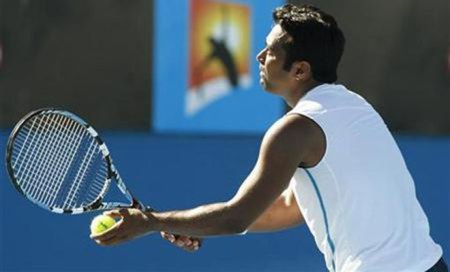 Tennis legend Margaret Court stated that she would never travel by Qantas airline again, after is came out in support of same sex marriages. (Illustration: C R Sasikumar)
Tennis legend Margaret Court stated that she would never travel by Qantas airline again, after is came out in support of same sex marriages. (Illustration: C R Sasikumar)
Lawn tennis legend Margaret Court, in a letter published in The West Australian newspaper, criticised Qantas for becoming an active promoter of same sex marriages. Court stated that she would never travel by the airline again. This incensed another tennis great, Martina Navratilova, who posted on the blog #wrongsideofhistory “Margaret — you have gone too far. Shame on you”, prompting her to join the chorus to rename the Margaret Court Arena. Court is now a senior pastor of Victory Life Church in Perth and believes that marriage can only be a union between a man and a woman. Navratilova, who is gay, is a campaigner for marriage equality. Incidentally, Court has won 24 Grand Slam titles from 1960 to 1973 which has not been surpassed. For this stupendous achievement, and for her services to Australian tennis, the complex, in 2003, was named Margaret Court Arena.
This ideological battle between two of tennis’ greatest players brings us right away to the key question that plural democracies such as ours have to deal with: What is the correct response to the demand for renaming?
In the past, a building, road, bridge, station, airport, etc, were named after persons in honour of their contribution to public life. A Victoria Terminus in Mumbai has become Chhatrapati Shivaji Terminus. Aurangzeb Road has become Dr Abdul Kalam Road in Delhi and Connaught Circus has become Rajiv Chowk. In the US, they are removing statues to leaders of the Confederate movement because of their support for slavery while in Oxford they are keeping theirs. The movement to remove the statue of Cecil Rhodes who was accused of the massacres and exploitation of black Africans as he amassed his wealth was unsuccessful because Oriel College, which was a beneficiary in his will, risked losing about £100 million if the statue was removed. They defended their decision stating that “the statue should remain in place and that the college will seek to provide a clear historical context to explain why it is there”.
Many issues emerge that need to be considered in these frequent contests concerning memory and honour. In most such acts of honouring, the primary issue is politics seen as a process of nation-building or as legitimacy conferring. Regimes gain when they honour the stalwarts of their political ideology. Another reason is the seduction of financial contributions from those honoured to the respective institutions. US universities have mastered this art of naming buildings, chairs, centres, etc in return for endowments. The Mahindra Humanities Center at Harvard was set up with a grant of $10 million from the Mahindra family. The third major factor is achievements in a range of fields, from music to science, military gallantry to sports. The Margaret Court Arena belongs to the third.
If naming is to honour, is renaming to dishonour? What are the grounds of withdrawing that honour, that is, some dishonourable action in the same domain where the honour was bestowed or even an action in a domain remote from the area of honour? Must we always take the full life of the person to be honoured, when making our decision, or should it be only in the area of excellence? Does Gandhiji’s family life matter when we bestow on him the title of Mahatma? Can areas be kept separate, sports from politics, sports from religion, such that the performance in one should be judged only by its own standards of excellence and not also be the standards of the other? Or should the totality be taken into account? Margaret Court’s views on gay marriage have prompted a call to withdraw the honour given to her for her tennis. Australian Prime Minister Malcolm Turnbull responded to only one of these questions when he said, “whatever people think of her opinion on gay marriage, she is one of the all-time greats and the arena celebrates that”. He endorsed the separation thesis.
But the issue requires us to go beyond the “separation” thesis without falling into the “totality” thesis as is being argued by some. We need to look at the controversial issue and debate what a proportional response to it would be if we are to retain our commitment to being both fair and ethically correct. For example, Yale University, in contrast to Oriel College’s decision to keep the Cecil Rhodes statue, has agreed to rename Calhoun College because he was a white supremacist and supporter of slavery. We must accept that changed times, and changed public values, demand such renaming. With respect to the Margaret Court Arena controversy, the two institutions that have official links with the venue, and with the sport of tennis, did take a public stand. The Melbourne and Olympic Parks organisation tweeted that it “does not support Margaret Court’s comments and we remain committed to embracing equality, diversity and inclusion; from our fans to our colleagues who deliver the events people love to attend”. No ambiguity in its support for marriage equality. Tennis Australia took an equally clear position. “As a legend of the sport, we respect Margaret Court’s achievements in tennis and her unmatched playing record. Her personal views are her own, and do not align with Tennis Australia’s values of equality, inclusion and diversity”. These two public pronouncements, I believe, have met the conditions of the doctrine of proportionality. Margaret Court has now the awkward task of positioning herself vis-à-vis her favourite institutions. Such positioning, vis-à-vis general principles, is what liberal democracy requires from all citizens. Each one must calculate the cost to themselves of the stands they wish to take.
The demand to rename the arena, however, appears to go beyond a proportional response. It seeks to honour only those from within its own ideological camp. There are hints of a totalitarian attitude here. I say this for the following reasons. First, Court must be entitled to her beliefs just as Navratilova is entitled to hers. Second, the holding of these beliefs must not cause direct harm to others. Third, society must be willing to accommodate a diversity of such beliefs since that is the character of a plural society. Beliefs must be allowed to compete for supporters in a free marketplace of ideas. From the social media marketplace, and from the official positions taken by the two official organisations, Court seems to be losing the battle for support. Four, ideas held in one domain should not be used as a basis for judgement in another domain where they have no traction unless they are deeply offensive and erode the core of the social compact. White supremacism is one such example. Does Court’s belief belong to this category of views? I am not so sure since first of all they have had no impact on the tennis court and secondly they do not translate into state policy. From their public pronouncements it is clear that public authority is moving in the direction of marriage equality. So even though I support Navratilova’s position on gay rights her demand to rename the Margaret Court Arena is out of proportion. She has hit the ball out of court. Advantage Margaret.

